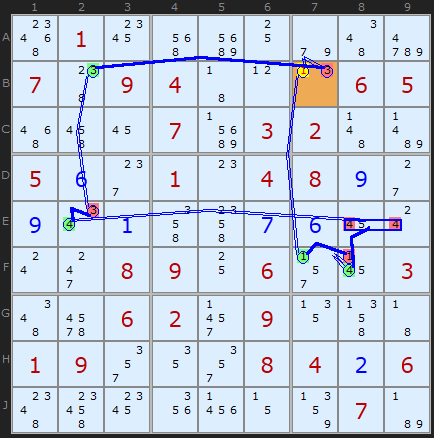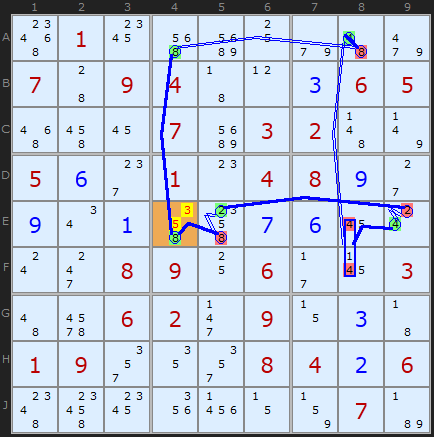AIC with Groups
Grouped nodes were discussed on the Grouped X-Cycles page and it is very relevant to Alternating Inference Chains. Luckily, there’s nothing too scary about them although they may be harder to spot.

The example on the right shows a classic and relatively simple deduction based on a loop that is predominantly candidates 3 and 4. But the two bi-value cells E8 and E9 containing 4/5 and 2/4 allow us to form strong links that continue the number 4 we’re tracing from E2 to F8. We end up with two weak links pointing to B7, where the 1 can be removed, thanks to Nice Loop Rule 3. Our grouped node on [E8|E9] acts just as a normal cell. The solver gives us:
AIC on 1 (Grouped Discontinuous Alternating Nice Loop, length 10):
+1[B7]-3[B7]+3[B2]-3[E2]+4[E2] -4[E8|E9]+4[F8]-1[F8]+1[F7]-1[B7]
- Contradiction: When B7 is set to 1 the chain implies it cannot be 1 - it can be removed

AIC on 8 (Grouped Discontinuous Alternating Nice Loop, length 10):
-8[E4]+8[A4]-8[A8]+4[A8]-4[E8|F8]
+4[E9]-2[E9]+2[E5]-8[E5]+8[E4]
- Contradiction: When 8 is removed from E4 the chain implies it must be 8 - other candidates 3/5 can be removed

Comments
Email addresses are never displayed, but they are required to confirm your comments. When you enter your name and email address, you'll be sent a link to confirm your comment. Line breaks and paragraphs are automatically converted - no need to use <p> or <br> tags.
... by: Rick
I have a screenshot but can’t see how to post it. Can anyone explain / help?
... by: Robert
Specifically - is there any kind of sensible group other than the same value candidate appearing two or three times within the intersection of a row and a box, or within a column and a box? Answer: no. You can contemplate other sorts of groups, but you don't get any sort of inference you can't get beyond what you get with these sorts of groups, which consist of the same valued candidate two or three times.
And - is it ever convenient to consider a group that consists only of two candidates, even when that would be a "sub group" of one containing three candidates? That is, does it ever make sense to have the group exclude candidates it could otherwise include? Answer: yes. Suppose the candidate "8" appears in A1, A2, A3, B1, and C1, and nowhere else in the box. There are other occurrences of the candidate "8" in the first column, and in the first row. Then you can break the five candidates in the box into two groups, either (A1 A2 A3), and (B1 C1), or (A2 A3) and (A1 B1 C1) - it doesn't matter which way you do it. Then the two groups are strongly linked. If there are weak links between (A1 B1 C1) and another candidate in column 1 and between (A1 A2 A3) and another candidate in row 1, the chain can use these two groups, connected by a strong link. If you included A1 in both groups, you couldn't do this - the two groups could both be "on".
... by: smmcroberts
... by: Atomic
In other words, let's say you visit a block and find a vertical group of 1's, but the uppermost cell in that group also has 2 as a possibility. Now you revisit the block again in the chain and find a horizontal group of 2's... but the leftmost cell is shared with the 1's group. Will this still be a valid Grouped AIC?